高中英语选修六Unit 5 The power of nature Warming up and reading 课件(28张)
文档属性
| 名称 | 高中英语选修六Unit 5 The power of nature Warming up and reading 课件(28张) | 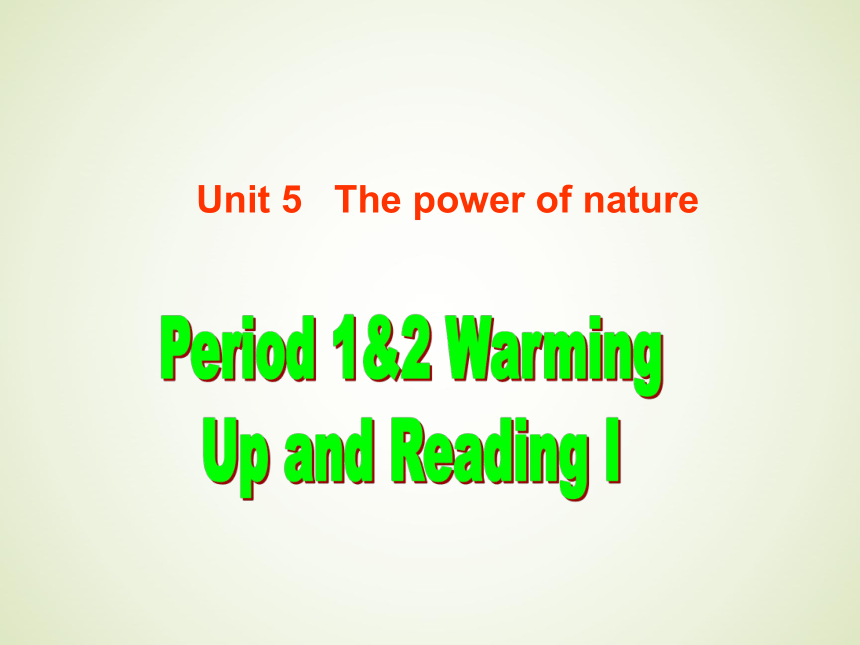 | |
| 格式 | zip | ||
| 文件大小 | 1.2MB | ||
| 资源类型 | 教案 | ||
| 版本资源 | 人教版(新课程标准) | ||
| 科目 | 英语 | ||
| 更新时间 | 2019-04-19 21:23:31 | ||
图片预览

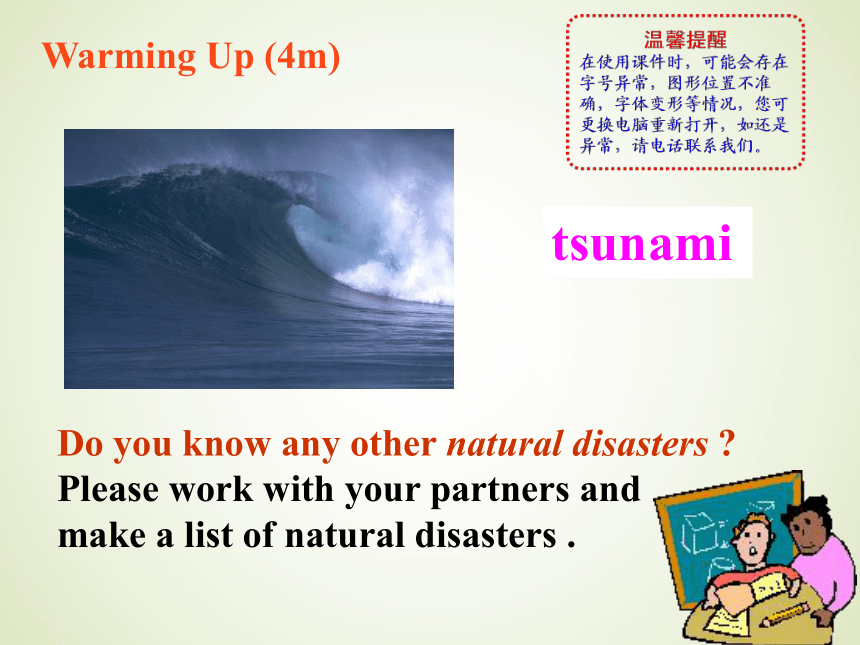
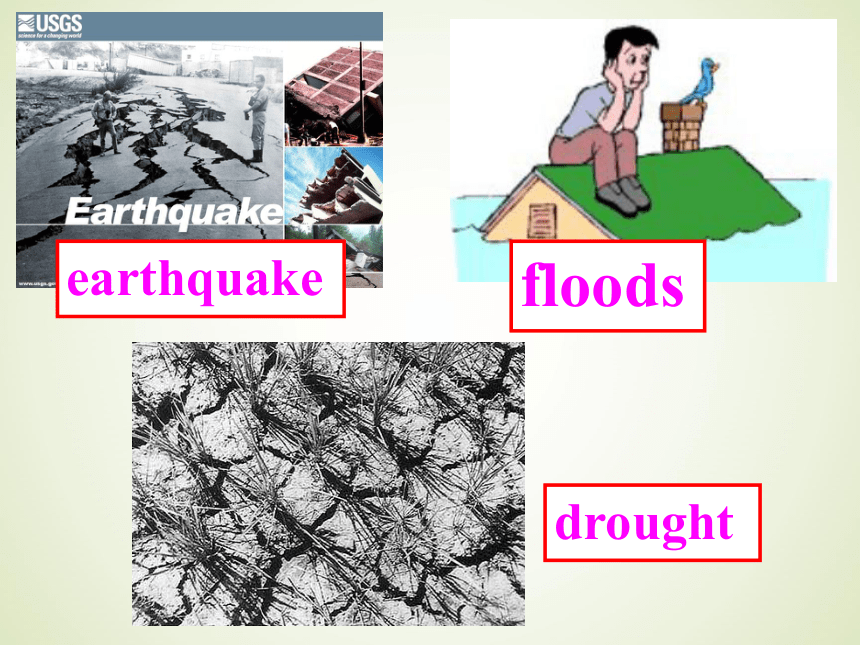
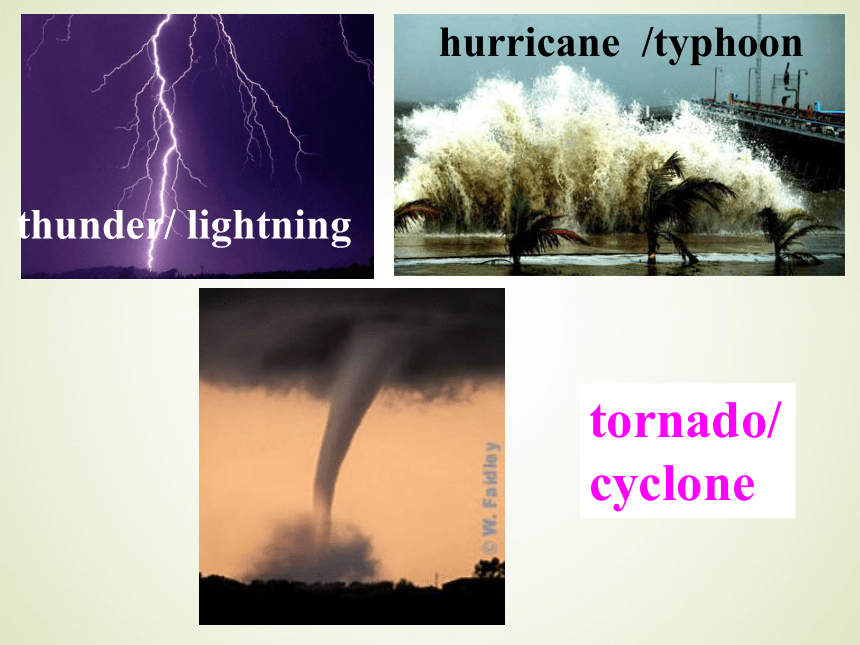
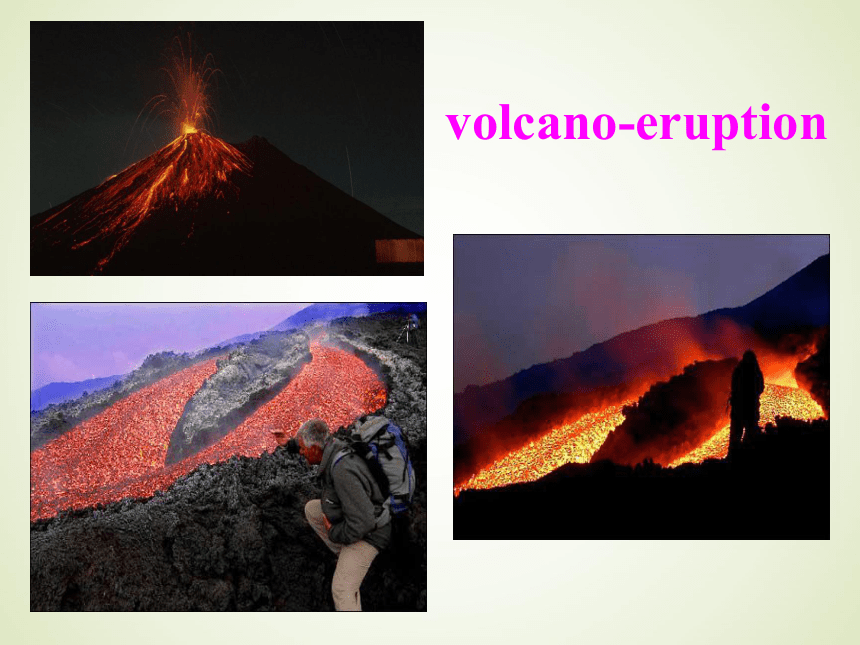
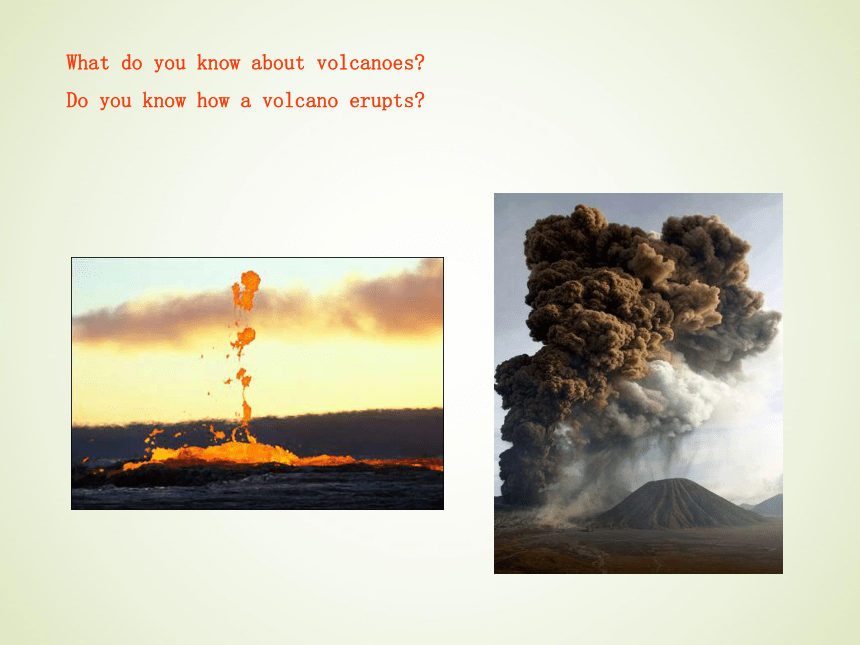
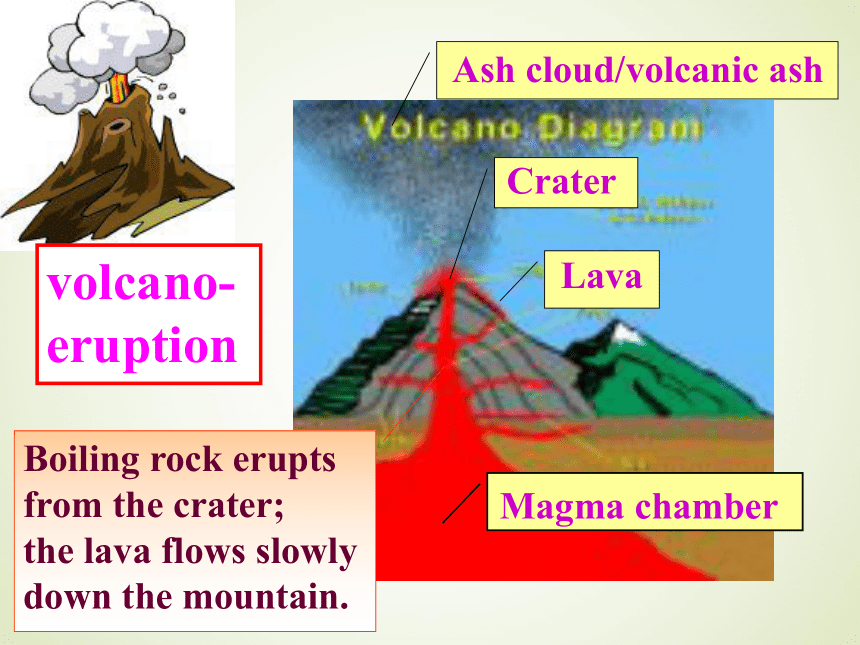
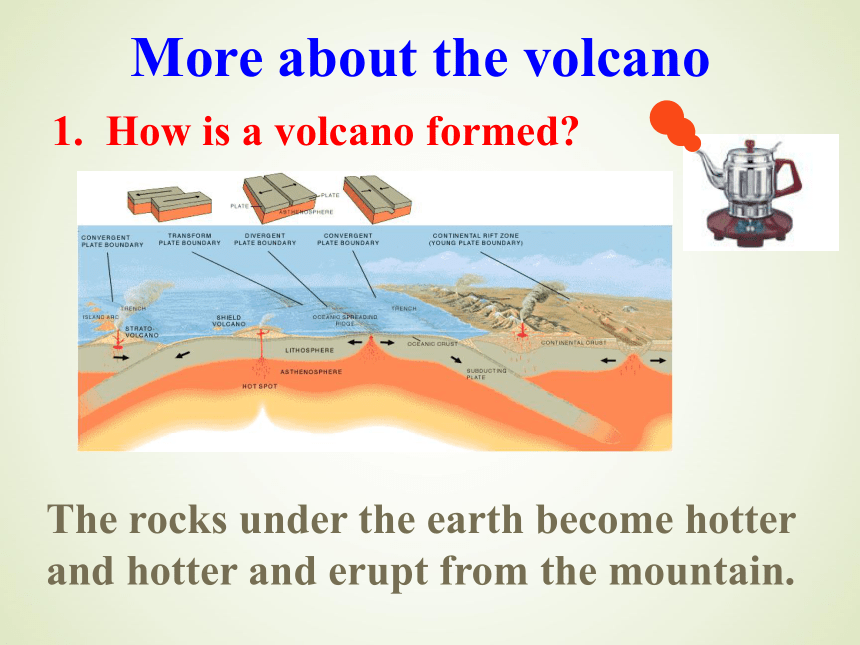
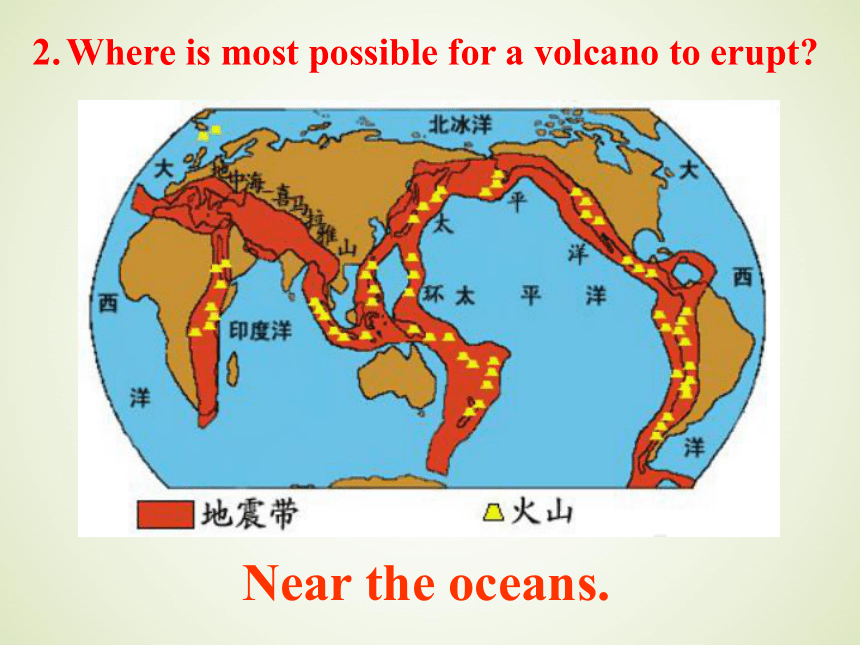
文档简介
课件28张PPT。Period 1&2 Warming
Up and Reading IUnit 5 The power of nature tsunamiDo you know any other natural disasters ?
Please work with your partners and
make a list of natural disasters .Warming Up (4m)earthquakefloodsdroughtthunder/ lightningtornado/cyclonehurricane /typhoonvolcano-eruptionWhat do you know about volcanoes?
Do you know how a volcano erupts?volcano-eruptionBoiling rock erupts from the crater;
the lava flows slowly down the mountain. Magma chamberLavaCraterAsh cloud/volcanic ashMore about the volcano1. How is a volcano formed?The rocks under the earth become hotter and hotter and erupt from the mountain.Near the oceans.Where is most possible for a volcano to erupt?An extinct volcanoHaleakala Crater, the largest dormant volcano in the world
Maui, HawaiiAn active volcano3. What types of volcanoes do you know?dormant volcanoMount Vesuvius
This mountain has erupted more than 50 times since the eruption in 79 A.D., when it buried Pompeii and its sister city, Herculaneum.
After Pompeii was buried and lost to history, the volcano continued to erupt every 100 years until about 1037 A.D., when it entered a 600-year period of quiescence.
In 1631, the volcano killed an additional 4, 000 unsuspecting inhabitants. What qualities are needed for a volcanologist?
Are you suitable for being a volcanologist ?
Answer “yes”or “no” to the following questions.Pre-reading (4m)Predicting
(预测) What might be talked about?What is the writer?
When did he first see an eruption? How did it look like?
What was he wearing when getting close to the crater? And what was the result?Skim the text and answer the following questionsSkimming (3m)What is the writer?
When did he first see an eruption? How did it look like?
He is a volcanologist working for the Hawaiian Volcano Observatory. He mainly collects information about Mount Kilauea.It was in the second week after he arrived in Hawaii. It was very bright although it was night. Red hot lava fountained hundreds of metres into the air and it was a fantastic sight.3. What was he wearing when getting close to the crater? And what was the result?He was wearing white protective suits that covered his whole body, helmets, big boots and special gloves, just like a spaceman. As a result, it made him difficult to walk.Why is a volcanologist’s job important?
Where is Mount Kilauea?Scan the text and answer the following questionsScanning (5m)Volcanologists study volcanoes so that they can warn people when the volcano is going to erupt and so save many lives.Mount Kilauea is in Hawaii.Why is the lava that flows on Mount Kilauea more dangerous than the actual eruption?
What caused the writer’s bedroom to become as bright as day even though it was night?The lava flows down the mountain and can cover up or burn villages in its path. The rocks that erupt from the volcano usually don’t damage anything because no one lives near the crater.The light that was caused by the red hot lava that erupted from the volcano.Why did the scientists have to get close to the volcano after it began erupting?
Why was it difficult for the writer to walk towards the edge of the crater?The scientists needed to get samples of the lava so they could study them.The writer was wearing special protective suits that made him difficult to walk.What does the writer find impressive about volcanoes even after studying them for many years?The writer finds their beauty and their potential to cause great damage very impressive.1.The writer doesn’t mind the
occasional danger of his job because ______.A. He travels to unusual places and meets
interesting people from all over the world.
B. He likes the different ways of working.C. He thinks his job the most important.
D. He is excited about danger and feels alive.2. What does the writer mean by using “lucky” in the sentence “ I was lucky enough to have a much closer look at it. ” ?A. He left much safer on the top while the other two scientists climbed down into the crater.
B. It was his first sight of an eruption.
C. It was the first time for him to watch the crater.
D. Both B and C.Part 1(Para 1-2)
Part 2(Para 3-4)
Part 3(Para 5)
The writer’s job and its importance The writer’s experience of watching the volcano eruptionThe reasons for the writer’s enthusiasm about his jobFind out the main idea of each part (4m)
Suppose you are a reporter of the 21st century, and you are interviewing the writer. Work in pairs and make up a dialogue according to your understanding of the passage.Dialogue production (5m)
Having learnt a little more about the work of a volcanologist, do you think it is an occupation you would enjoy? Discuss your reasons with others in your class.Discussion (8m)Discuss what skills you think a volcanologist should have in pairs.Essential skillsDegree and/or Doctor’s degree in geology
Interest in Earth science which includes:
knowledge of volcanoes
knowledge how magma (hot, liquid rock) erupts and how it behaves
research skills
skill in analysing and interpreting research results and other information
practical skills for performing experiments and operating scientific equipmentDesirable skillsComputer skills
Foreign languages
Practical skills such as:
the ability to read maps.
problem-solving skills.
planning and organizational skills.
communication skills.
writing skills, for writing reports and for publications. Assignment (Homework) Find out words, expressions and sentences which you think are useful, important or difficult to understand.
Finish exercises in Learning about Language. (Ex. 1, 2)Have a rest!
Up and Reading IUnit 5 The power of nature tsunamiDo you know any other natural disasters ?
Please work with your partners and
make a list of natural disasters .Warming Up (4m)earthquakefloodsdroughtthunder/ lightningtornado/cyclonehurricane /typhoonvolcano-eruptionWhat do you know about volcanoes?
Do you know how a volcano erupts?volcano-eruptionBoiling rock erupts from the crater;
the lava flows slowly down the mountain. Magma chamberLavaCraterAsh cloud/volcanic ashMore about the volcano1. How is a volcano formed?The rocks under the earth become hotter and hotter and erupt from the mountain.Near the oceans.Where is most possible for a volcano to erupt?An extinct volcanoHaleakala Crater, the largest dormant volcano in the world
Maui, HawaiiAn active volcano3. What types of volcanoes do you know?dormant volcanoMount Vesuvius
This mountain has erupted more than 50 times since the eruption in 79 A.D., when it buried Pompeii and its sister city, Herculaneum.
After Pompeii was buried and lost to history, the volcano continued to erupt every 100 years until about 1037 A.D., when it entered a 600-year period of quiescence.
In 1631, the volcano killed an additional 4, 000 unsuspecting inhabitants. What qualities are needed for a volcanologist?
Are you suitable for being a volcanologist ?
Answer “yes”or “no” to the following questions.Pre-reading (4m)Predicting
(预测) What might be talked about?What is the writer?
When did he first see an eruption? How did it look like?
What was he wearing when getting close to the crater? And what was the result?Skim the text and answer the following questionsSkimming (3m)What is the writer?
When did he first see an eruption? How did it look like?
He is a volcanologist working for the Hawaiian Volcano Observatory. He mainly collects information about Mount Kilauea.It was in the second week after he arrived in Hawaii. It was very bright although it was night. Red hot lava fountained hundreds of metres into the air and it was a fantastic sight.3. What was he wearing when getting close to the crater? And what was the result?He was wearing white protective suits that covered his whole body, helmets, big boots and special gloves, just like a spaceman. As a result, it made him difficult to walk.Why is a volcanologist’s job important?
Where is Mount Kilauea?Scan the text and answer the following questionsScanning (5m)Volcanologists study volcanoes so that they can warn people when the volcano is going to erupt and so save many lives.Mount Kilauea is in Hawaii.Why is the lava that flows on Mount Kilauea more dangerous than the actual eruption?
What caused the writer’s bedroom to become as bright as day even though it was night?The lava flows down the mountain and can cover up or burn villages in its path. The rocks that erupt from the volcano usually don’t damage anything because no one lives near the crater.The light that was caused by the red hot lava that erupted from the volcano.Why did the scientists have to get close to the volcano after it began erupting?
Why was it difficult for the writer to walk towards the edge of the crater?The scientists needed to get samples of the lava so they could study them.The writer was wearing special protective suits that made him difficult to walk.What does the writer find impressive about volcanoes even after studying them for many years?The writer finds their beauty and their potential to cause great damage very impressive.1.The writer doesn’t mind the
occasional danger of his job because ______.A. He travels to unusual places and meets
interesting people from all over the world.
B. He likes the different ways of working.C. He thinks his job the most important.
D. He is excited about danger and feels alive.2. What does the writer mean by using “lucky” in the sentence “ I was lucky enough to have a much closer look at it. ” ?A. He left much safer on the top while the other two scientists climbed down into the crater.
B. It was his first sight of an eruption.
C. It was the first time for him to watch the crater.
D. Both B and C.Part 1(Para 1-2)
Part 2(Para 3-4)
Part 3(Para 5)
The writer’s job and its importance The writer’s experience of watching the volcano eruptionThe reasons for the writer’s enthusiasm about his jobFind out the main idea of each part (4m)
Suppose you are a reporter of the 21st century, and you are interviewing the writer. Work in pairs and make up a dialogue according to your understanding of the passage.Dialogue production (5m)
Having learnt a little more about the work of a volcanologist, do you think it is an occupation you would enjoy? Discuss your reasons with others in your class.Discussion (8m)Discuss what skills you think a volcanologist should have in pairs.Essential skillsDegree and/or Doctor’s degree in geology
Interest in Earth science which includes:
knowledge of volcanoes
knowledge how magma (hot, liquid rock) erupts and how it behaves
research skills
skill in analysing and interpreting research results and other information
practical skills for performing experiments and operating scientific equipmentDesirable skillsComputer skills
Foreign languages
Practical skills such as:
the ability to read maps.
problem-solving skills.
planning and organizational skills.
communication skills.
writing skills, for writing reports and for publications. Assignment (Homework) Find out words, expressions and sentences which you think are useful, important or difficult to understand.
Finish exercises in Learning about Language. (Ex. 1, 2)Have a rest!
